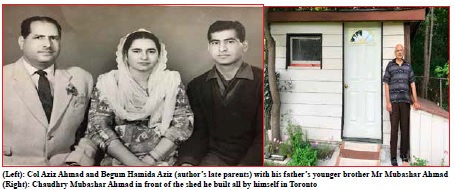Honoring Uncles and Aunts
By C. Naseer Ahmad
Washington, DC

July 26 every year is a very special day around many countries in the world for honoring Uncle and Aunts. The website NationalToday.com provides a very good perspective: “ Our aunts and uncles are unique parts of our family; they can be like a second set of parents, or great friends you happen to be related to. Often, they’ve watched us grow up, and are full of stories about things we did in our youth we might not even remember.”
People say that in “ the Ashanti tribe of Ghana, aunts and uncles can sometime discipline and raise their siblings’ children”. They’re essentially a second set of parents, who your real parents trust the most because, well, they were raised together. Some note that “ in Polynesian cultures, anyone older than you may be addressed as aunt or uncle as a term of respect and endearment. For readers of South Asian origin, these values would sound familiar and the natural outcome of what they have experienced in their own families.
The push and pull in modern living have in perhaps far too many ways impacted family life but there are some human bonds that have withstood a lot of stress and the test of time. Among those bonds is the relationship and respect for uncles and aunts.
Quite possibly you might be thinking about the uncles and aunts in your own family and through the different stages of life. The smiling faces and the loving embraces of one or more of these family elders will come into your mind, not to mention how many times they might have overlooked some of your own mistakes.
This is certainly true for this writer who has been the fortunate beneficiary of the love and kindhearted support of so many aunts and uncles. The memories are still fresh, and the impressions on our character eternally etched. Each one taught me something that is not only with me but also made me a better human being.

Believers see guidance in their lives often from the sayings of the Prophet who said: “He is not of us who does not have mercy on young children, nor honor the elderly” (Al-Tirmidhi). From the Prophet’s life and his love for his elders one can understand the wisdom which means that respect for the elders allows one to build a meaningful relationship with them.
Love and respect for the elders, which certainly includes uncles and aunts, is not a one-way street. Rather, it can become a gift that keeps on giving. By giving love and respect to uncles and aunts, you are setting a path for the children to follow, and this cycle of love and respect will forever continue in your family.
This writer is lucky to have several uncles and aunts who are still around. It is my good fortune to be able to communicate with them either directly via phone, email, texting or just FaceTime. Sometimes this communication is through cousins who pass messages of love back and forth.
Since Toronto, Canada is within driving distance from Washington, I have made it a point to visit my Uncle Mubashar Ahmad, who is the only one left amongst my father’s siblings. His loving wife Aunty Salam is one of the two surviving siblings of my mother. Since the pandemic has resulted in travel restrictions, we now meet on FaceTime. They are my heroes because without their financial support, I could not have achieved education in the US.
The most impressive thing about Uncle Mubashar even after two heart attacks is that he has not only continued his active life but also built a shed in his backyard with bare hands. For a man in his eighties, he has a teenager’s eagerness to learn.
Life is short so chances are that when you look at family albums, you might see pictures of people who are not around anymore. So, look around and if you are lucky to have your uncles and aunts around be sure to reach out to them. There are many ways to be in touch and show respect. Spend some quality time with them, share a meal or tea together or just call to say thank you.
-----------------------------------------------------------------------------
Back to Pakistanlink Homepage

